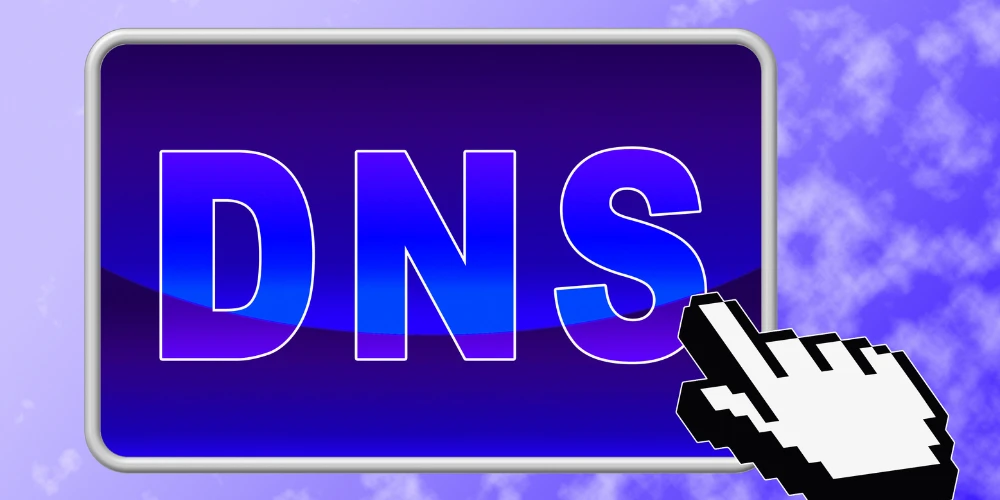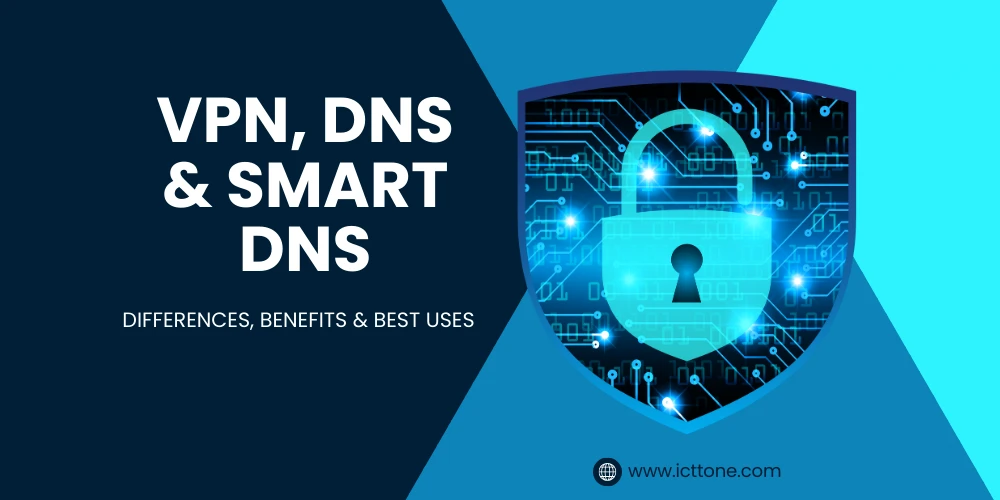The internet offers us endless possibilities—entertainment, learning, and connection with people worldwide. But this openness also brings certain challenges, especially when it comes to privacy, security, and access. The content you want may be blocked in your region, or your data might be exposed to potential threats. To navigate these issues, people turn to tools like VPN, DNS, and Smart DNS.
But what exactly are these tools, and how do they work? While they may seem similar, VPN, DNS, and Smart DNS serve different purposes. Knowing the differences can help you decide which one to use for your specific needs—whether that’s protecting your privacy, bypassing regional restrictions, or simply speeding up your connection.
In this guide, we’ll dive into the details of each tool, explaining how they function, their benefits, and their drawbacks. By the end, you’ll understand which one is the right fit for you, whether you’re a regular internet user, a streaming enthusiast, or someone who values online security.
1. What Is VPN?
A VPN (Virtual Private Network) is a service that hides your IP address and encrypts your internet traffic. When you connect to a VPN, all your online activity is hidden from others, even your Internet Service Provider (ISP). This makes it ideal for privacy and security.

How VPN Works
When you connect to a VPN, it creates a secure, private tunnel for your data. Think of it as a pathway through which your internet activity flows without others seeing it. For example, if you connect to a server in another country, your IP address changes to that location. This way, your online identity stays private and secure.
NordVPN is a popular VPN choice due to its strong encryption, fast speeds, and wide range of servers globally. It also works well for bypassing geo-restrictions. This means you can watch shows on Netflix from other countries with ease.
Benefits of Using a VPN
- Privacy: VPN hides your IP address, keeping your online activity private.
- Security: VPN encrypts your data, protecting it from hackers.
- Access to Content: VPN lets you access websites and streaming services that might be restricted in your country.
Downsides of Using a VPN
- Speed Reduction: VPN can slow down your internet speed as it reroutes your traffic.
- Device Compatibility: Some devices, like smart TVs, may not support VPN apps.
- Cost: Most reliable VPNs, like NordVPN, come with a monthly or yearly fee.
2. What Is DNS?
DNS (Domain Name System) is like the phone book of the internet. It translates domain names (like www.example.com) into IP addresses, allowing your browser to find and load websites.
When you type a website name into your browser, DNS quickly finds the IP address associated with it. However, your ISP’s DNS server may not always be fast or secure. By changing your DNS server, you may speed up your connection or access restricted websites.

How DNS Works
Imagine typing “www.website.com” into your browser. The DNS server finds the IP address for that website, like “192.168.1.1,” allowing your browser to connect. Without DNS, you would have to remember the IP address of every website you want to visit, which would be challenging.
Benefits of Using a Custom DNS
- Faster Speeds: Some DNS servers can improve internet speed.
- Added Security: Public DNS options, like Google DNS, often come with better security against attacks.
- Free to Use: Many DNS services, like Google’s Public DNS, are free.
Downsides of Using DNS
- No Privacy: DNS does not hide your IP address, so your ISP can still see your activity.
- Limited Access: DNS does not unblock websites with geo-restrictions, meaning you cannot access streaming services from other countries.
3. What Is Smart DNS?
Smart DNS is a tool that helps you access geo-restricted content, like streaming services in other countries. Unlike VPN, Smart DNS does not change your IP address or encrypt your data. Instead, it reroutes only part of your traffic to bypass regional restrictions.

How Smart DNS Works
Smart DNS works by rerouting your DNS requests. For example, if you’re in a country where certain content is restricted, Smart DNS sends your request through a server in a country where that content is allowed. This way, it looks like you’re in the allowed region, even though your IP address does not change.
Many Smart DNS services are available as part of a VPN package or as a standalone service. For instance, NordVPN offers a Smart DNS feature called MediaStreamer, allowing users to access restricted content on devices that may not support VPNs, like certain smart TVs.
Benefits of Using Smart DNS
- Access Content: Smart DNS helps you access blocked websites and streaming services.
- Fast Speeds: Smart DNS doesn’t encrypt your data, making it faster than a VPN.
- Device Compatibility: Smart DNS works on more devices, like game consoles and smart TVs.
Downsides of Using Smart DNS
- No Privacy: Smart DNS doesn’t hide your IP address, so your activity is still visible.
- No Encryption: It does not secure your data, which could expose you to potential risks.
4. Comparison: VPN vs. DNS vs. Smart DNS
Now that we’ve explored VPN, DNS, and Smart DNS individually, let’s compare them to help you decide which might suit your needs best. Each tool has unique features, benefits, and limitations. Here’s a closer look:
Privacy and Security
- VPN: VPN is the best choice for privacy and security. It hides your IP address and encrypts your data, making it nearly impossible for hackers, governments, or your ISP to track what you’re doing online.
- DNS: Regular DNS offers no privacy. Your ISP can see and log your online activities when you use its default DNS servers. Switching to a custom DNS may improve speed and security slightly, but it does not protect your privacy.
- Smart DNS: Smart DNS doesn’t encrypt your traffic or hide your IP address. It only reroutes part of your data to help you access restricted content, meaning it offers no additional privacy or security.
Winner for Privacy: VPN
Speed
- VPN: VPNs encrypt data and reroute it through servers in other locations, which can slow down your connection. While some VPNs, like NordVPN, have high-speed servers that minimize this slowdown, there is typically a slight reduction in speed.
- DNS: Using a custom DNS server can make your connection faster. Some public DNS servers, such as Google DNS or Cloudflare DNS, are optimized for speed and reliability.
- Smart DNS: Since Smart DNS does not encrypt data or change your IP, it’s generally faster than a VPN. This makes Smart DNS a good option if speed is your main priority.
Winner for Speed: DNS and Smart DNS
Unblocking Geo-Restricted Content
- VPN: VPNs are excellent for bypassing geo-restrictions. By connecting to a VPN server in a different country, you can access websites and streaming services as if you were in that location. NordVPN, for example, has servers in many countries, making it easy to unlock content worldwide.
- DNS: DNS alone cannot unblock geo-restricted content. It only translates domain names to IP addresses without masking your actual location.
- Smart DNS: Smart DNS is designed to unblock geo-restricted content. By rerouting part of your connection, it allows access to streaming services like Netflix, Hulu, or BBC iPlayer from different regions.
Winner for Unblocking: VPN and Smart DNS
Device Compatibility
- VPN: VPNs are compatible with most devices, including computers, tablets, and smartphones. However, some devices, such as gaming consoles or certain smart TVs, may not support VPN apps directly. To use a VPN on these devices, you may need to set it up on your router.
- DNS: DNS is universally compatible since every internet-connected device uses DNS. Switching to a custom DNS server is usually simple and possible on any device.
- Smart DNS: Smart DNS has broad compatibility, often working on devices that VPNs cannot support directly, like game consoles and smart TVs.
Winner for Compatibility: DNS and Smart DNS
| Criteria | VPN | DNS | Smart DNS |
|---|---|---|---|
| Privacy | High – Encrypts and hides IP | None | None |
| Speed | Slower than DNS/Smart DNS | Fast | Fast |
| Unblocking | Yes – Can change your location | No | Yes – Allows access to some geo-restricted content |
| Compatibility | Computers, mobile devices | All internet-enabled devices | Most devices, including Smart TVs |
| Cost | Subscription required (e.g., NordVPN) | Free | Often requires a small fee |
5. When to Use VPN, DNS, or Smart DNS
Each tool has its strengths. Here’s a quick guide on when to choose VPN, DNS, or Smart DNS, based on different scenarios:
Scenario 1: You Want Complete Privacy and Security
If privacy and security are your top concerns, a VPN is the best option. A VPN encrypts your data, hides your IP address, and ensures your ISP cannot track your activities. This is useful if you’re dealing with sensitive information or browsing on public Wi-Fi.
Example: Imagine you’re working in a coffee shop. Using a VPN will secure your connection so others on the same Wi-Fi cannot access your data. NordVPN, for example, has strong security protocols to protect against hackers and snooping.
Scenario 2: You Want to Speed Up Your Internet
If you want faster internet, switching to a custom DNS server might help. Sometimes, ISP DNS servers can be slow, especially during peak hours. Using a fast, public DNS server like Google DNS can improve connection speeds slightly.
Example: If your streaming or browsing feels slow, changing your DNS settings to a public DNS might make a noticeable difference, especially on local sites or services.
Scenario 3: You Want to Access Streaming Services from Other Countries
If you mainly want access to geo-restricted content, either VPN or Smart DNS can work. A VPN will provide access to streaming services worldwide, but it may slightly reduce speed. Smart DNS can unblock some content without slowing down your internet speed, though it offers no privacy benefits.
Example: If you want to watch shows on Netflix US from a different country, Smart DNS can help. However, if you want privacy while watching, use a VPN like NordVPN.
Scenario 4: You Want Privacy, Security, and Unblocking Combined
If you need both privacy and access to global content, a VPN is the top choice. VPNs combine privacy, security, and unblocking abilities, making them the most versatile solution. Some VPNs, like NordVPN, even offer a Smart DNS feature as part of their package.
Example: If you want to browse securely and watch shows from different countries, a VPN is the ideal choice. You can connect to a server in the region of your choice while keeping your data secure and hidden.
6. How Each Tool Works: VPN, DNS, and Smart DNS Explained
Now, let’s look at the technical side of these tools. Understanding how each one works can help you see which will best fit your needs.
How VPN Works
When you connect to a VPN, it creates a secure, encrypted tunnel between your device and the VPN server. Your internet traffic flows through this tunnel before reaching its final destination, hiding your IP address and protecting your data. Here’s a breakdown of how this process works:
- Encryption: VPN encrypts your data, making it unreadable to anyone trying to intercept it. Only the VPN server can decrypt the information, ensuring your privacy.
- IP Masking: The VPN replaces your actual IP address with the IP of the VPN server you’re connected to. This tricks websites and services into thinking you’re located in the region of the server.
- Traffic Rerouting: Instead of sending data directly from your device to a website, a VPN routes it through its server, giving you additional layers of security and access.
Example: Suppose you connect to a NordVPN server in the United States from Europe. Your IP address changes to a U.S.-based IP, making it appear as though you’re browsing from within the U.S. This allows access to U.S.-only streaming services while also encrypting your data for added security.
How DNS Works
The Domain Name System (DNS) is often called the “phone book of the internet.” It translates human-friendly web addresses (like www.example.com) into machine-friendly IP addresses. Here’s how it works:
- Domain Lookup: When you enter a website address, your device sends a request to a DNS server, asking for the IP address linked to that domain.
- IP Address Match: The DNS server searches for the IP address associated with the requested domain.
- Connection: Your browser uses the IP address to establish a connection to the website.
Most people use the default DNS server provided by their ISP. However, switching to a custom DNS, like Google DNS or Cloudflare, may increase speed and security.
Example: When you enter “www.nytimes.com,” DNS translates this into an IP address like “151.101.129.164,” allowing your browser to connect and load the site.
How Smart DNS Works
Smart DNS is different from regular DNS and VPN. It doesn’t change your IP or encrypt your data. Instead, Smart DNS reroutes only specific DNS requests to bypass geo-restrictions. Here’s how it works:
- Partial Rerouting: Smart DNS reroutes part of your data, specifically DNS requests related to region-restricted content.
- DNS Modification: The Smart DNS server changes the DNS information for specific websites, making it look like your request is coming from an allowed location.
- Direct Connection: Unlike a VPN, Smart DNS does not redirect all traffic. Only the DNS information for restricted content is affected, keeping other parts of your connection fast and unchanged.
Example: Suppose you’re in Australia but want to watch U.S. Netflix. A Smart DNS service modifies the DNS data to make it look like your device is in the U.S., giving you access to U.S.-exclusive content.
7. VPN, DNS, or Smart DNS: Pros and Cons Summary
To help make your choice easier, here’s a quick summary of the pros and cons of each tool.
VPN: Pros and Cons
Pros:
- High Security: Encrypts all your internet traffic.
- Privacy: Hides your IP address from websites and ISPs.
- Unblocks Content: Access content from various countries.
Cons:
- Speed: Can reduce internet speed due to encryption.
- Compatibility: Limited compatibility with some devices like smart TVs.
- Cost: Reliable VPNs, such as NordVPN, require a subscription.
DNS: Pros and Cons
Pros:
- Free Options: Public DNS services like Google and Cloudflare are free.
- Simple Setup: Works on any device with internet access.
- Speed: May improve internet speed slightly.
Cons:
- No Privacy: Does not hide your IP or encrypt data.
- Limited Access: Cannot unblock geo-restricted content.
Smart DNS: Pros and Cons
Pros:
- Unblocks Content: Provides access to some restricted content.
- Fast Connection: Does not affect internet speed like VPNs.
- Broad Compatibility: Works on devices like smart TVs and gaming consoles.
Cons:
- No Security: Does not encrypt data or hide your IP address.
- Limited Content: Not all geo-restricted content may be accessible.
8. Choosing the Right Tool for Your Needs
When deciding between VPN, DNS, and Smart DNS, consider your main goals:
- For Privacy and Security: VPN is the best choice. It hides your IP address and encrypts all your data, protecting your information from your ISP and potential hackers. If privacy is critical, go for a VPN like NordVPN, known for its secure encryption and high-speed servers.
- For Faster Internet: If speed is more important than privacy, switching to a custom DNS server may improve your internet performance. Google DNS and Cloudflare DNS are popular, reliable options.
- For Accessing Streaming Services: If you’re primarily interested in unblocking geo-restricted content, both VPN and Smart DNS are good options. A VPN provides more security, while Smart DNS offers faster connections and broader compatibility with devices.
Combining VPN and Smart DNS
Some services offer a combination of VPN and Smart DNS. This setup lets you enjoy both privacy and access to restricted content on devices that might not support VPN. For example, NordVPN’s MediaStreamer feature combines the flexibility of Smart DNS with the security of a VPN, making it ideal for users who want the best of both worlds.
Example: Using NordVPN’s MediaStreamer, you can set up Smart DNS on your smart TV while keeping a secure VPN connection on your main device, such as a laptop or smartphone. This gives you flexibility without sacrificing security on devices that support VPN.
FAQs on VPN, DNS, and Smart DNS
Yes, many VPNs, including NordVPN, come with their own DNS servers. This setup ensures that all your internet traffic goes through secure, private DNS servers, giving you an additional layer of privacy.
Yes, changing your DNS server is generally safe. Many people switch to public DNS servers, like Google DNS or Cloudflare, for improved speed and reliability. Just be cautious if using a less-known DNS provider, as it may not have the same level of security.
No, Smart DNS does not typically affect your internet speed because it doesn’t encrypt or reroute all your traffic. It only changes DNS requests, so your connection remains fast.
Yes, a VPN can reduce your internet speed slightly because it encrypts data and routes it through a server in another location. However, top-tier VPNs like NordVPN have high-speed servers to minimize this speed loss.
Yes, Smart DNS can often bypass streaming restrictions for services like Netflix, Hulu, and BBC iPlayer. However, it doesn’t work on all streaming platforms and doesn’t provide privacy or security.
No, DNS does not protect your privacy. While a custom DNS may offer slightly better security than your ISP’s default, it does not encrypt your data or hide your IP address. For privacy, use a VPN.
To set up Smart DNS, go to your TV’s network settings and manually enter the DNS server details provided by your Smart DNS service. Some VPN providers, like NordVPN, offer Smart DNS as part of their service to simplify this process.
VPNs require more infrastructure, like encrypted servers and high-speed connections worldwide, which makes them costlier. A good VPN also invests in security, customer support, and advanced features that Smart DNS typically lacks.
Conclusion: Choosing Between VPN, DNS & Smart DNS
Choosing between VPN, DNS, and Smart DNS depends on your needs:
- VPN: Best for privacy, security, and unblocking content. It encrypts your data and hides your IP address, making it ideal if you want full anonymity and protection from hackers. A VPN like NordVPN is a reliable option, offering excellent security, many global servers, and access to geo-restricted content.
- DNS: Good if you’re only looking to boost internet speed or want a simple way to change your DNS settings. DNS does not offer privacy or unblocking features, so it’s limited in functionality.
- Smart DNS: Great for unblocking streaming services without slowing down your connection. Smart DNS is faster than VPNs and works on devices that may not support VPNs, such as smart TVs and gaming consoles. However, it does not encrypt your data or hide your IP.
For most users, a VPN provides the best balance of security, privacy, and content access. If you want both privacy and the ability to unblock content, VPN is the way to go. If privacy isn’t a concern, Smart DNS might be a good alternative.
Share this post:



